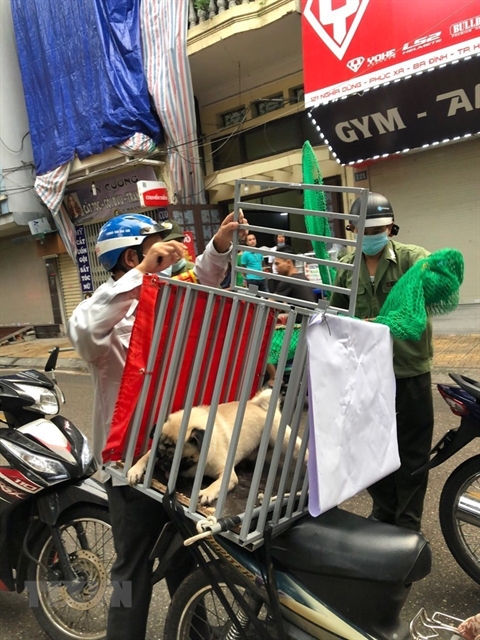 Society
Society


|
| A stray dog is captured in Phúc Xá Ward, Ba ĐÌnh District in Hà Nội. The Ministry of Agriculture and Rural Development has asked localities to set up teams to catch rabid and stray dogs. VNA/VNS Photo |
HÀ NỘI — The Ministry of Agriculture and Rural Development (MARD) has urged cities and provinces nationwide to set up teams to catch stray dogs in an attempt of curbing dog bite-related fatalities and better managing rabies among domestic dogs and cats.
The move followed a fatal dog attack in southern Bình Phước Province last week. A pit bull weighing more than 30 kilograms bit an eight-year-old boy’s hand and neck, killing him.
At the recent press briefing, Vice Minister Phùng Đức Tiến said all cities and provinces must tighten the management of domestic dogs and cats to prevent future incidents.
"This is not the first time this heartbreaking incident has happened. There have been many dog attacks that have left people dead or injured,” he said.
“The regulations on pet dog management are complete and available. Wearing a muzzle for a dog is mandatory when taking it out in public,” he said.
Tiến said that dog owners must take responsibility for attacks, even criminal charges if the attack caused harm.
HCM City and Hà Nội have already established teams to catch stray dogs, consisting of six to eight members, including a police officer, veterinary worker, local militia members and volunteers, to ensure rabies-free zones in the cities.
Pet owners who wish to take their dogs back will have to bear all related fees if their dogs are captured, including caretaking costs and culling.
If dogs and cats bite or scratch other people, owners will also be expected to pay compensation to the victims.
Figures from the Ministry of Agriculture and Rural Development show that in the past ten years, Việt Nam has spent VNĐ8 trillion (US$342.4 million) on rabies prevention and control. Each year, the country spends an average of VNĐ800 billion (34.2 million) on the disease.
The full management of domestic dogs and cats is critical to reducing the risks of rabies infections in people.
Tiến said cities and provinces need to perfect the veterinary system to effectively manage the disease.
Due to the recent merger of veterinary forces into agricultural service forces in localities, 6,000 veterinarians have quit their jobs, significantly affecting disease surveillance and management.
He cited the outbreak of African swine fever as an example. The outbreak lead to six million pigs being culled, ten per cent of the total national herd, which affected the consumer price index.
Tiến said currently, ten provinces have not upgraded their veterinary system.
Responding to questions about the restriction or ban on the raising of vicious dog breeds, Tiến emphasized that legal documents stipulated dogs be kept under control with either a muzzle or lead in public.
He also said it was difficult to identify vicious dog breeds in legal documents to restrict or ban the raising as there were hundreds of dog breeds.
Nguyễn Văn Long, acting director of the ministry’s Department of Animal Health said the ministry’s Circular 07 issued in 2016 stipulated that dog owners must register their pets and declare ownership with the commune-level people's committees, and committed to keeping dogs within the confinement of their residence to avoid causing risks to the public.
Pet owners must compensate victims if their pet bites or scratches other people.
Long said early this year, the ministry asked localities to review the registration of pets. Local authorities must improve the management of domestic dogs and rabies prevention work. — VNS




